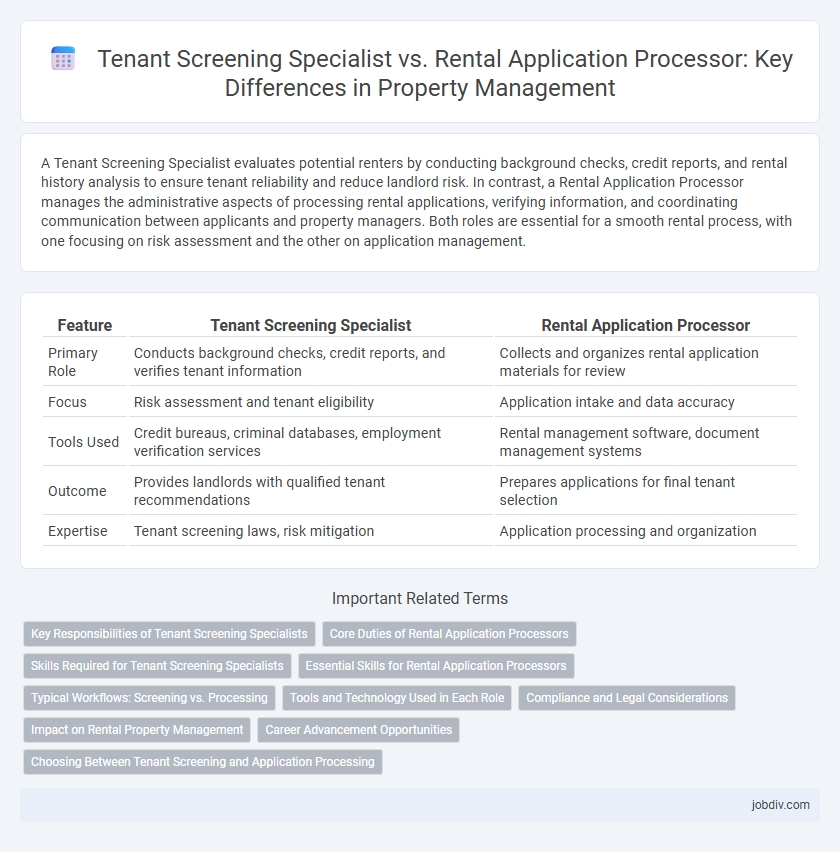A Tenant Screening Specialist evaluates potential renters by conducting background checks, credit reports, and rental history analysis to ensure tenant reliability and reduce landlord risk. In contrast, a Rental Application Processor manages the administrative aspects of processing rental applications, verifying information, and coordinating communication between applicants and property managers. Both roles are essential for a smooth rental process, with one focusing on risk assessment and the other on application management.
Table of Comparison
| Feature | Tenant Screening Specialist | Rental Application Processor |
|---|---|---|
| Primary Role | Conducts background checks, credit reports, and verifies tenant information | Collects and organizes rental application materials for review |
| Focus | Risk assessment and tenant eligibility | Application intake and data accuracy |
| Tools Used | Credit bureaus, criminal databases, employment verification services | Rental management software, document management systems |
| Outcome | Provides landlords with qualified tenant recommendations | Prepares applications for final tenant selection |
| Expertise | Tenant screening laws, risk mitigation | Application processing and organization |
Key Responsibilities of Tenant Screening Specialists
Tenant Screening Specialists conduct thorough background checks, including credit history, criminal records, and rental history verification, to assess tenant eligibility and minimize landlord risk. They analyze financial documents and references to ensure applicants meet lease requirements and provide detailed screening reports to property managers. Their role is crucial in maintaining occupancy quality and reducing potential rental disputes.
Core Duties of Rental Application Processors
Rental Application Processors focus on collecting and verifying tenant information, including credit history, employment status, and rental background, ensuring accuracy and completeness of applications. They coordinate communication between landlords and applicants, managing documentation and facilitating the approval workflow. Their core duties emphasize efficient data handling and compliance with rental regulations to streamline the leasing process.
Skills Required for Tenant Screening Specialists
Tenant Screening Specialists require expertise in credit analysis, background checks, and tenant verification to accurately assess applicant reliability. Proficiency with tenant screening software and knowledge of Fair Housing laws ensure compliance and ethical decision-making. Strong communication and analytical skills are essential for interpreting data and providing detailed reports to property managers.
Essential Skills for Rental Application Processors
Rental Application Processors require strong organizational skills, attention to detail, and proficiency in handling tenant data accurately to ensure smooth processing of rental applications. They must be adept at verifying applicant information, coordinating background checks, and maintaining clear communication with both tenants and landlords. Expertise in using property management software and understanding legal compliance in tenant screening significantly enhances their efficiency in managing rental workflows.
Typical Workflows: Screening vs. Processing
Tenant Screening Specialists conduct background checks, verify credit history, and assess rental references to determine applicant eligibility, ensuring landlords select qualified tenants. Rental Application Processors handle the intake, organization, and verification of rental applications, managing documentation and communication between tenants and property managers. Screening workflows emphasize risk assessment and decision-making, while processing workflows focus on data management and administrative efficiency.
Tools and Technology Used in Each Role
Tenant Screening Specialists utilize advanced background check software, credit reporting tools, and eviction databases to assess applicant reliability and financial stability. Rental Application Processors rely heavily on property management software, digital application platforms, and document verification tools to streamline the submission and review of tenant applications. Both roles leverage automated systems and data analytics to ensure accurate and efficient tenant selection processes.
Compliance and Legal Considerations
Tenant Screening Specialists focus on thorough background checks and credit evaluations to ensure applicants meet legal standards and fair housing regulations, minimizing the landlord's risk of non-compliance. Rental Application Processors manage submission, verification, and documentation in accordance with state and federal laws, ensuring all required disclosures and consent forms are properly obtained. Both roles require strict adherence to Fair Credit Reporting Act (FCRA) guidelines to maintain compliance and protect tenant rights during the rental application process.
Impact on Rental Property Management
Tenant Screening Specialists enhance rental property management by thoroughly evaluating applicants' credit, background, and rental history, reducing the risk of tenant defaults and property damage. Rental Application Processors streamline the management workflow by efficiently handling documentation and verifying information, accelerating approval times and improving applicant experience. Together, these roles optimize tenant selection quality and operational efficiency, directly impacting occupancy rates and property profitability.
Career Advancement Opportunities
Tenant Screening Specialists gain expertise in evaluating credit reports, background checks, and rental histories, providing a strong foundation for roles in property management or leasing consultancy. Rental Application Processors develop skills in data entry, documentation verification, and compliance with housing regulations, which can lead to opportunities in administrative management or compliance coordination. Both positions offer distinct career advancement paths, with Tenant Screening Specialists often progressing towards risk assessment roles and Rental Application Processors advancing to operational management within rental agencies.
Choosing Between Tenant Screening and Application Processing
Tenant Screening Specialists focus on evaluating credit reports, criminal backgrounds, and eviction histories to ensure reliable tenants for rental properties. Rental Application Processors handle the administrative tasks of collecting, verifying, and organizing rental applications to streamline the leasing process. Choosing between the two depends on whether the priority is thorough risk assessment or efficient application management in the rental workflow.
Tenant Screening Specialist vs Rental Application Processor Infographic

 jobdiv.com
jobdiv.com